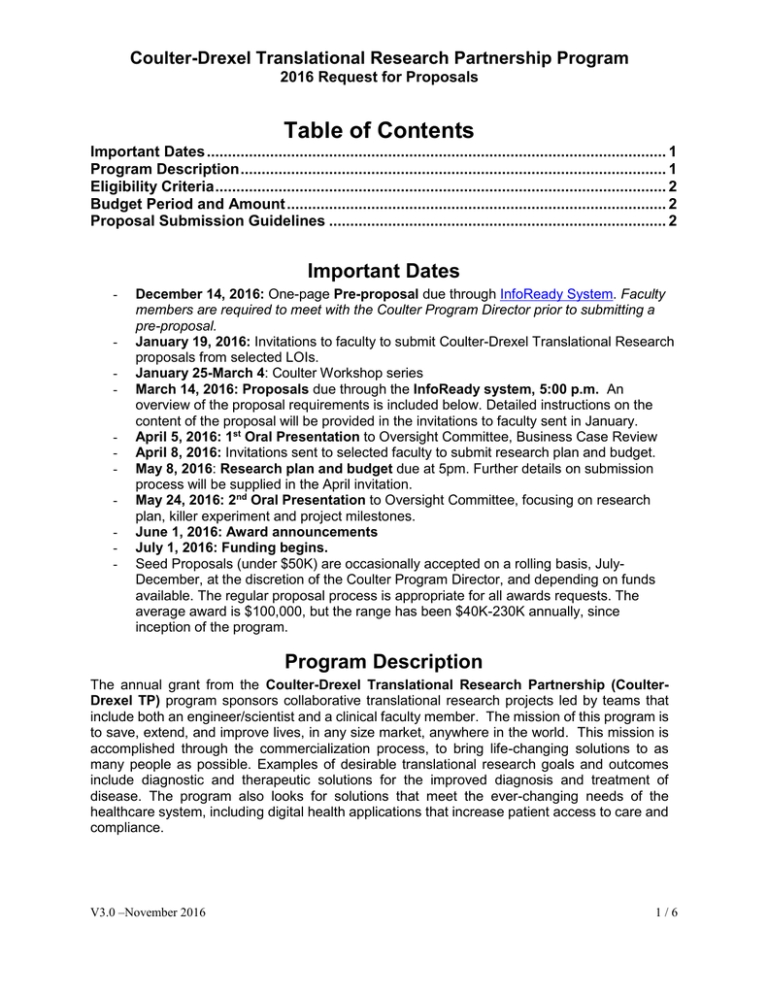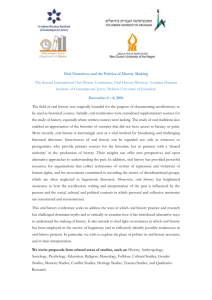Table of Contents Coulter-Drexel Translational Research Partnership Program
advertisement

Coulter-Drexel Translational Research Partnership Program 2016 Request for Proposals Table of Contents Important Dates ............................................................................................................. 1 Program Description ..................................................................................................... 1 Eligibility Criteria ........................................................................................................... 2 Budget Period and Amount .......................................................................................... 2 Proposal Submission Guidelines ................................................................................ 2 Important Dates - - - December 14, 2016: One-page Pre-proposal due through InfoReady System. Faculty members are required to meet with the Coulter Program Director prior to submitting a pre-proposal. January 19, 2016: Invitations to faculty to submit Coulter-Drexel Translational Research proposals from selected LOIs. January 25-March 4: Coulter Workshop series March 14, 2016: Proposals due through the InfoReady system, 5:00 p.m. An overview of the proposal requirements is included below. Detailed instructions on the content of the proposal will be provided in the invitations to faculty sent in January. April 5, 2016: 1st Oral Presentation to Oversight Committee, Business Case Review April 8, 2016: Invitations sent to selected faculty to submit research plan and budget. May 8, 2016: Research plan and budget due at 5pm. Further details on submission process will be supplied in the April invitation. May 24, 2016: 2nd Oral Presentation to Oversight Committee, focusing on research plan, killer experiment and project milestones. June 1, 2016: Award announcements July 1, 2016: Funding begins. Seed Proposals (under $50K) are occasionally accepted on a rolling basis, JulyDecember, at the discretion of the Coulter Program Director, and depending on funds available. The regular proposal process is appropriate for all awards requests. The average award is $100,000, but the range has been $40K-230K annually, since inception of the program. Program Description The annual grant from the Coulter-Drexel Translational Research Partnership (CoulterDrexel TP) program sponsors collaborative translational research projects led by teams that include both an engineer/scientist and a clinical faculty member. The mission of this program is to save, extend, and improve lives, in any size market, anywhere in the world. This mission is accomplished through the commercialization process, to bring life-changing solutions to as many people as possible. Examples of desirable translational research goals and outcomes include diagnostic and therapeutic solutions for the improved diagnosis and treatment of disease. The program also looks for solutions that meet the ever-changing needs of the healthcare system, including digital health applications that increase patient access to care and compliance. V3.0 –November 2016 1/6 Eligibility Criteria All primary investigators on a Coulter-Drexel TP sponsored project serve as Co-Principal Investigators (Co-PI’s). Each proposal must include at least one clinical Co-PI from a College of Medicine, Nursing or Public Health and at least one Co-PI holding an appointment in an engineering field, including media arts and design. At least one of the PIs must have a faculty appointment at Drexel University. The clinical Co-PI's job responsibilities must include direct contact with patients or patient data. The research must relate directly to applications in health care, and the objectives of the project should include an outcome that will benefit patients when the technology is commercialized. Questions about faculty eligibility should be referred to the Kathie Jordan, Coulter Program Director. Evaluation of each proposal is based on the following criteria: Significant unmet or underserved clinical need Scientific merit, and substantial improvement over current solutions or standard clinical practice Strength and nature of the clinical collaboration Reasonable and achievable milestones Intellectual property position High probability of attracting follow-on funding, within 2-3 years of the Coulter award In order to enhance Drexel University’s Translational Research Partnership with the Kimmel Cancer Center Consortium at Thomas Jefferson University (TJU), joint teams are encouraged to apply for Coulter-Drexel TP funding in cancer diagnostics and therapeutics. Budget Period and Amount Full Proposal: Coulter-Drexel TP full proposal funds are granted for a one-year period. Full proposal budgets have historically ranged from $60K-230K of direct costs per year. Proposals may be submitted for additional support in subsequent years, if the commercialization and research milestones from the first year were completed successfully. Renewal applications will be evaluated on a competitive basis with new applications. Seed Proposal: Coulter-Drexel TP Seed proposal funds are for a period less than oneyear and their budgets have historically ranged from $10K-60K of direct costs. Occasionally, the program is able to consider seed funding requests. Seed proposals may be submitted for full funding upon successful completion of the initial milestones. Please contact Kathie Jordan, kcj39@drexel.edu, for specific instructions regarding the application for seed proposals. Proposal Submission Guidelines Proposal submission is a three-stage process. The first step is to submit a 1-2-page Preproposal. Selected projects will then be invited to submit a Full Proposal in step 2, and the Research Plan and Budget in step 3. Step 1: Pre-proposal Submission Guidelines Deadline: December 14, 2015, 5pm, through the InfoReady System Faculty members are required to meet with Kathie Jordan, Coulter Program Director, prior to submitting a pre-proposal. To schedule a meeting, please e-mail Kathie, kcj39@drexel.edu, with three times that you are available, prior to December 14, 2015. V3.0 –November 2016 2/6 Body of the Pre-proposal: The pre-proposal is a one-two page narrative which should include the following topics. For the body of the text, please use Arial, 11pt font, 1” margins. Type density should confirm with standard NIH guidelines (no more than 15 characters per inch, no more than six lines per inch.) You are encouraged to use section titles and images or graphs, as necessary, to assist the reviewers in understanding your proposal. Please do not exceed two pages total. Preproposals that do not conform to these guidelines may not be reviewed. 1. Non-Confidential Project Title Provide a non-confidential title intended for a lay audience that succinctly conveys what the envisioned product is, what it does, and what problem it solves. 2. Project Team List each of your team members and their affiliations. For each, briefly describe their area of expertise and what their proposed role on the project will be. Keep in mind that project teams must be comprised of at least one faculty member who is developing the technology and one practicing clinician, at least one of which must have a faculty appointment at Drexel. 3. Clinical need Describe the clinical problem or the unmet need. Use metrics, such as the number of patients affected annually, health care expenditures for treatment and/or diagnosis, potential for reduction in costs, and the likely future trends relevant to the problem, etc. Why is this problem unresolved? 4. Standard of Care How is the clinical problem/unmet need currently addressed (current standard of care)? Describe current protocols for management of the problem/unmet need. What specialized diagnostic or therapeutic tools (drugs, devices or equipment) are currently used to address the problem/unmet need? 5. Value Proposition How will your envisioned product address the problem/unmet need better than the standard of care or other emerging approaches? What will compel or drive the adoption of your product over others? How is your envisioned solution distinct and what are its advantages compared to other approaches? 6. Technical solution What is your proposed product or method that will solve this problem? What is unique or innovative about it? What tangible components or services will be sold/deployed? How will your product change or improve patient care? 7. Enabling Technology V3.0 –November 2016 3/6 What is the innovation you have discovered or technology you have developed that will enable your envisioned product? Briefly comment on the current stage of development, i.e. what do you presently have in hand: a concept, drawings, a prototype, benchtop/in vitro data, animal data, human data? What preliminary data suggests that your technology will work in the way you predict, and be safe and effective? What other technology/components will be required to create your envisioned product? 8. Estimated budget One sentence, describing the one-year direct costs for personnel, minor equipment and supplies, travel. There are no indirect costs on Coulter budgets. 9. Intellectual Property The intellectual property status, including invention disclosures, patent applications filed, shared IP ownership with others. Please note that while you do not need to have a patent application filed for your idea, you must have submitted an Invention Disclosure Form, http://drexel.edu/commercialization/drexel-community/process/, to the Office of Technology Commercialization, in order to qualify for pre-proposal review. The pre-proposals will be screened by the executive committee of the Coulter-Drexel TP Oversight Committee (OC). Investigators will be invited to proceed to the next step in the application process on or before January 19, 2016. Step 2: Full Proposal Submission Procedure Deadline: March 14, 2015, Full Proposals due at 5pm Full proposals consist of a cover page, proposal, conflict of interest statement, project team profile, list of current grant support, timeline for obtaining follow-on funding, intellectual property summary, and citations. The proposal section (no more than six pages) will build on the preproposal and will cover the clinical context, value proposition, business opportunity, regulatory and legal considerations. Complete details regarding the full proposal will be sent to invited faculty by January 19, 2016 and will also be available on the Coulter-Drexel website. The Coulter workshop series, held from late January through early March, is designed to assist faculty in preparing the proposals. Though not required, faculty members are strongly encouraged to participate and bring any other members of the project team. Further details about the Coulter Workshop series will be made available in December. Step 3: Research Work Plan and Budget Deadline: May 9, 2016, Research Plan and Budget due at 5pm. Invited faculty members will be asked to prepare a detailed research plan and budget (4 pages total), for final review by the oversight committee. An overview is provided below. Additional details will be supplied by Friday, April 8, 2016 to faculty who are invited for this step. Research Plan: V3.0 –November 2016 4/6 A detailed research plan should address the milestones over the year of funding. In addition, the plan should demonstrate understanding of the timelines needed to bring the product to the point of licensing and/or to market. Graphical timelines work well to show the quarterly and yearly milestones the project will need to hit on the way prior to licensing, gaining regulatory approval and eventually reaching the market. a. Killer Experiment (1 page): Describe the objectives, plan and rationale that demonstrates whether the technology works or not and that it can be licensable in 1-3 years. More generally, this can also be thought of as an experiment that significantly mitigates risk of commercialization. Document any business advisers or commercial partners who have helped you define the killer experiment. Examples are below: i. Initial proof-of-concept. ii. Demonstration of safety and efficacy in an animal model that is highly predictive to success in humans. iii. Small clinical trials in target patient populations or healthy volunteers. iv. Demonstrating that the technology will be adopted and have a positive clinical impact. b. Got-to-Market Timeline (1 page): Describe the major technical and business milestones that the project needs to reach after Coulter funding. Include possible sources of funding after Coulter funding expires, and how that funding will be used to further derisk the project. Examples of appropriate sources of follow-on funding include SBIR/STTR grants, state commercialization funds (eg. Ben Franklin Technology Partners), sponsored research agreements, angel and venture capital. Do your best to provide informed estimates for both time and funds required. c. Gantt chart (1 page): A Gantt chart template will be provided, and made available on the Coulter website. Use this to list specific activities for your killer experiment, as well as commercial goals, and intellectual property milestones over the year of Coulter funding. Budget: Prepare a detailed research budget including all the direct costs for personnel, materials, supplies and equipment needed to meet your stated research goals. Please describe the use of funding in detail. Major capital expenditures are not permitted, but minor capital equipment items specifically needed for the execution of the research plan are acceptable. Outsourcing as possible is encouraged to improve quality and speed. Funds may be used for salary support of faculty, graduate students, and other research staff, but may not be used for general staff or administrative support. Please note that the milestonedriven nature of Coulter projects makes them more appropriate to be staffed by senior graduate students, post-doctoral fellows or staff scientists, rather than new graduate students. Operating supplies, minor equipment items, prototyping expenses, imaging time and travel directly associated with the research activity are examples of eligible budget items. Since this is an internal award, indirect costs (i.e. overhead) are not permitted. Please include direct costs only. Post Award: All award recipients, including clinical investigators, will be required to submit quarterly progress reports using the quarterly report form and to meet once monthly with the Coulter Program Director and advisors. Projects that are on schedule may have a reduced meeting V3.0 –November 2016 5/6 schedule. Guidelines for the quarterly report will be sent 2-3 weeks prior to each report due date. Full grant awardees will also be required to present one progress report to the Coulter-Drexel Oversight Committee, typically scheduled for December. Continuation of funding is dependent on Oversight Committee approval at these meetings, as well as regular meetings with the Coulter Program Director, and timely submission of quarterly reports. PLEASE NOTE: THE COULTER PROGRAM OFFICE RESERVES THE RIGHT TO PERFORM DILIGENCE ON ALL SUBMISSIONS USING INTERNAL, STUDENT OR EXTERNAL RESOURCES. SUCH DILIGENCE MAY INCLUDE BUT IS NOT LIMITED TO MARKET RESEARCH, PATENTABILITY, REIMBURSEMENT AND REGULATORY ANALYSIS. PLEASE NOTE THAT BY SUBMITTING A PROPOSAL FOR CONSIDERATION, YOU IMPLICITLY AGREE THAT YOUR PROPOSAL CAN BE REVIEWED BY THE ABOVE MENTIONED RESOURCES AND THAT YOU MAY BE CONTACTED FOR ADDITIONAL INFORMATION/CLARIFICATION IN RELATION TO SUCH DILIGENCE PROJECTS. Questions: For questions regarding the award and/or preparation of proposals, please contact: Kathie Jordan, PhD Coulter Program Director kcj39@drexel.edu Office 215.895.1860 Amy Campbell Assistant Coulter Program Director akc32@drexel.edu Office 215.571.3704 V3.0 –November 2016 6/6


